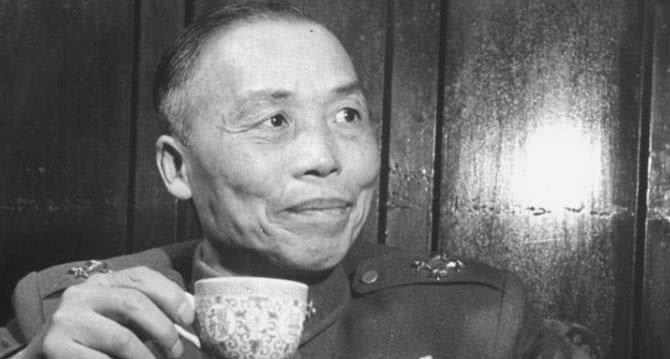Friends who may be familiar with modern history know that Chiang Kai-shek's military dependence is on his own concubine generals, like miscellaneous generals, who he does not believe in or reuse at all. In fact, this phenomenon is not completely true, although Chiang Kai-shek prefers to use the Huangpu generals, but the miscellaneous generals, if they really have military ability, Chiang Kai-shek will also reuse, but they are not very trusting, and reuse and trust are two different things. Reuse is that the superior appreciates your talent, and trust is that the superior trusts you as a person. Therefore, Chiang Kai-shek did not all reuse his own Huangpu generals. For example, during the War of Resistance Against Japanese Aggression, Jiang Dingwen, one of his five tiger generals, lost 200,000 soldiers and horses in World War I and was dismissed by Chiang Kai-shek, thus ending his military career. There were also several Huangpu generals who disobeyed military orders during the War of Resistance Against Japanese Aggression and were shot by Chiang Kai-shek. It can be seen that if mistakes were made in the War of Resistance Against Japan, both concubines and miscellaneous cards would also be punished.
However, among the miscellaneous generals, four of them were specially promoted and appointed by Chiang Kai-shek because of their certain military ability, and they all held high-ranking official positions in the eight-year War of Resistance Against Japan. For example, Li Zongren, commander of the Fifth Stage District who won the Battle of Taierzhuang during the War of Resistance Against Japanese Aggression, was a miscellaneous general. He was not only a miscellaneous general, but also led the Gui forces to resist Chiang Kai-shek.

After the end of the famous Northern Expedition, warlords everywhere went to war with Chiang Kai-shek over disarmament issues. Li Zongren was one of them, and he successively participated in a series of anti-Chiang Kai-shek activities, such as the Central Plains War against Chiang Kai-shek, the Chiang-Gui War, and the Liangguang Incident, and also participated in the activities to overthrow Chiang Kai-shek twice, pulling the old Chiang Kai-shek out of power. Although Li Zongren regarded Chiang Kai-shek as an enemy, after the outbreak of the War of Resistance Against Japan, Chiang Kai-shek, in order to unite all the military forces that could be united, still promoted and reused Li Zongren and made him the commander of the Fifth Theater. It should be known that Li Zongren was the leader of the Gui warlords, and he had soldiers in his hands, plus the Gui army's bravery and good fighting, and his performance in the War of Resistance was also obvious to all.
There is also Bai Chongxi, who is the second most important person in the Gui clan, and because of his outstanding military talent, he is known as the little Zhuge of the Republic of China. Although he had participated in and planned anti-Chiang Kai-shek incidents again, Chiang Kai-shek still admired this little Zhuge Ge more. Therefore, after the outbreak of the War of Resistance Against Japanese Aggression, he invited Bai Chongxi to go north to discuss the anti-Japanese plan. He also served as an important military planner of the Supreme Commander, along with Chiang Kai-shek's concubines Chen Cheng and He Yingqin, as well as a Jin general Xu Yongchang and called the Four Giants of the Headquarters. He successively participated in the planning of a series of large-scale battles such as the Battle of Songhu, the Battle of Wuhan, and the Battle of Changsha, and also made certain contributions to the War of Resistance Against Japan.
However, as one of the four ministers of the General Headquarters during the War of Resistance Against Japanese Aggression, Xu Yongchang was not a concubine of Chiang Kai-shek, he was a general who was more important to the local warlord Yan Xishan, but because of his outstanding talent, he was favored by Chiang Kai-shek, so after the outbreak of the War of Resistance, Xu Yongchang was transferred by Chiang Kai-shek from the local high command to the military command department. Because Xu Yongchang did not pull gangs within the Nationalist army and did not form factions to devote himself wholeheartedly to the cause of the War of Resistance, he participated in 22 large-scale battles successively, and made great contributions to the victory of the War of Resistance. And after the surrender of the Japanese Kou, Xu Yongchang represented the Republic of China to attend the Japanese surrender ceremony.
The last one is Xue Yue, and everyone may think that Xue Yue is a general of Chiang Kai-shek's concubine, but in fact, he is not, he belongs to the General of Guangdong. In his early years, he was a loyal fan of Mr. Nakayama, and later because of his bravery in battle, he was appreciated by Chiang Kai-shek, but he also opposed Chiang Kai-shek and proposed to arrest Chiang Kai-shek, but he was opposed and did not implement it. For this reason, there was also a gap between Chiang Kai-shek and Xue Yue, and he did not trust him very much. However, Xue Yue should be appreciated by Chen Cheng, plus he could also fight, so his career was still relatively smooth later.
Especially in the War of Resistance Against Japan, Chiang Kai-shek originally made Chen Cheng the commander of the Ninth Theater, but Chen Cheng recommended Xue Yue, so Chiang Kai-shek appointed Xue Yue as the acting commander of the Ninth Theater, replacing Zhang Zhizhong, one of Chiang Kai-shek's eight great kongs. It was precisely because of Chen Cheng's recommendation and Chiang Kai-shek's promotion and appointment that he was the commander of the theater that annihilated the largest number of enemies in the War of Resistance Against Japan.